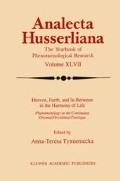Abstract
Husserl’s phenomenology, in a certain sense, is a theory of pure consciousness, one which tries to lay an absolute, ultimate and rigorous ground for the sciences in the field of pure consciousness. Husserl believes that through his phenomenology he can provide eternal significance for the spiritual life of human beings. I think that intentionality is a key concept in the theory of pure consciousness in Husserl’s phenomenology, that for Husserl it plays an important role in the realization of his philosophical ideal. In contrast, Chinese philosophy does not pay any attention to how an absolute and ultimate ground for the sciences is to be found and how a set of moral norms and a theory of value for the life of human beings may be derived from logical and scientific knowledge. Rather, Chinese philosophy is concerned with how to adjust the relationships between Heaven (Tian, 天 in Mandarin Chinese) and man, and between man and man in secular life, and does not value pure logic, pure science, and pure consciousness as does Husserl’s phenomenology. Chinese philosophy establishes an experiential and intuitive “mind” (Xin, 心) as the ground of moral reason. The existence of this “mind” does not need to be proven by a rigorous logic and a theory of science - any person can often perceive his own “mind” in daily life, and can thereby, by analogy, discern the “mind” of others.3
To set up the mind for Heaven and Earth; to establish their Heaven-ordained being for the people.
Chang Tsai ( 〔宋〔 張載)
Man muss erst die Welt durch έπoχή verlieren, um sie in universaler Selbstbesinnung wiederzugewinnen.2
Husserl
Access this chapter
Tax calculation will be finalised at checkout
Purchases are for personal use only
Preview
Unable to display preview. Download preview PDF.
Notes
Husserl distinguishes between immanent essence and transcendent essence. Cf. Husserliana III, 1; ed. K. Schuhmann (The Hague: 1976), pp. 128, 131.
Cf. T. Adorno, Against Epistemology: A Metacritique, trans. Willis Domingo (Cambridge, Mass.: 1984).
Cf. Prof. A-T. Tymieniecka, “A Dialogue Between Chinese Philosophy and Occidental Philosophy in Meeting the Challenge of Our Times,” in Journal of Chinese Philosophy 13 (1986), pp. 271–282.
Author information
Authors and Affiliations
Editor information
Editors and Affiliations
Rights and permissions
Copyright information
© 1995 Springer Science+Business Media Dordrecht
About this chapter
Cite this chapter
Xian, Z. (1995). Husserl’s Intentionality and the “Mind” in Chinese Philosophy. In: Tymieniecka, AT. (eds) Heaven, Earth, and In-Between in the Harmony of Life. Analecta Husserliana, vol 47. Springer, Dordrecht. https://doi.org/10.1007/978-94-011-0247-6_6
Download citation
DOI: https://doi.org/10.1007/978-94-011-0247-6_6
Publisher Name: Springer, Dordrecht
Print ISBN: 978-94-010-4110-2
Online ISBN: 978-94-011-0247-6
eBook Packages: Springer Book Archive

